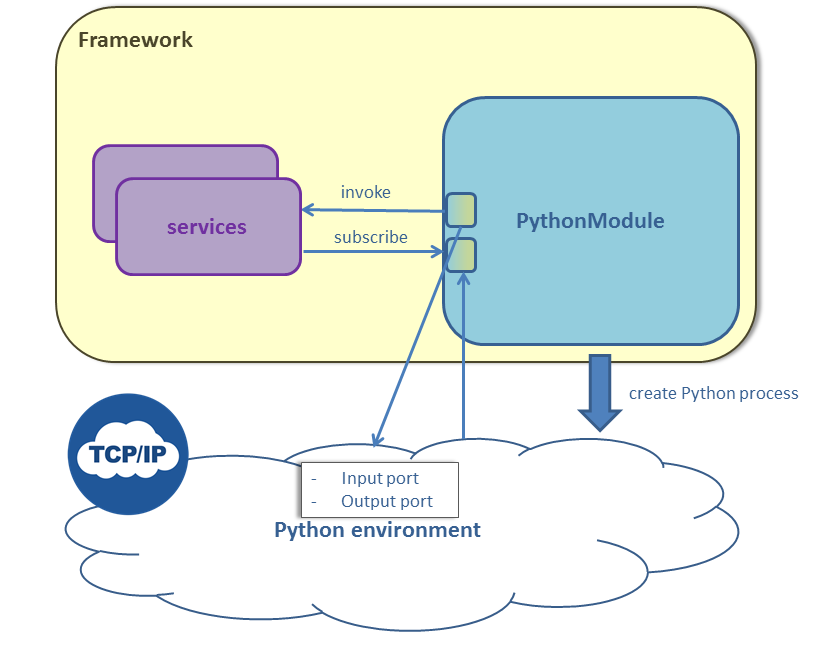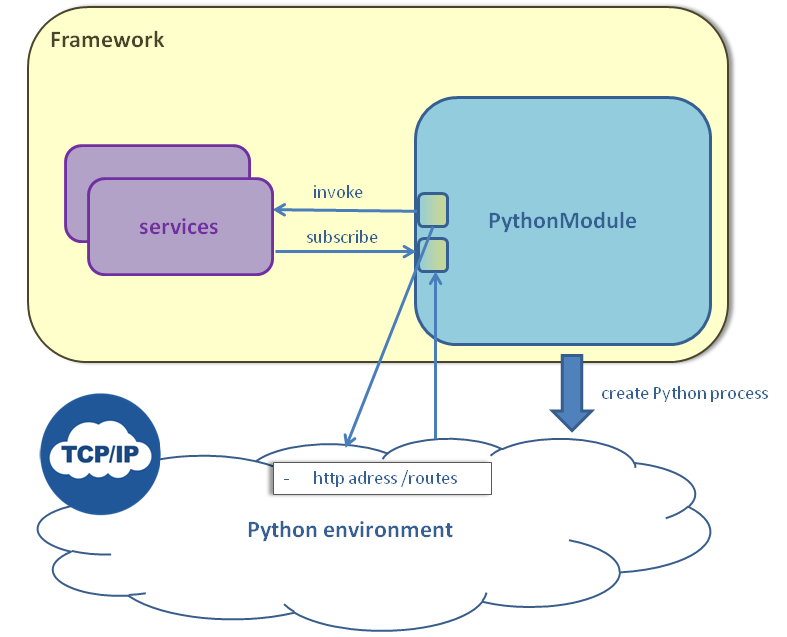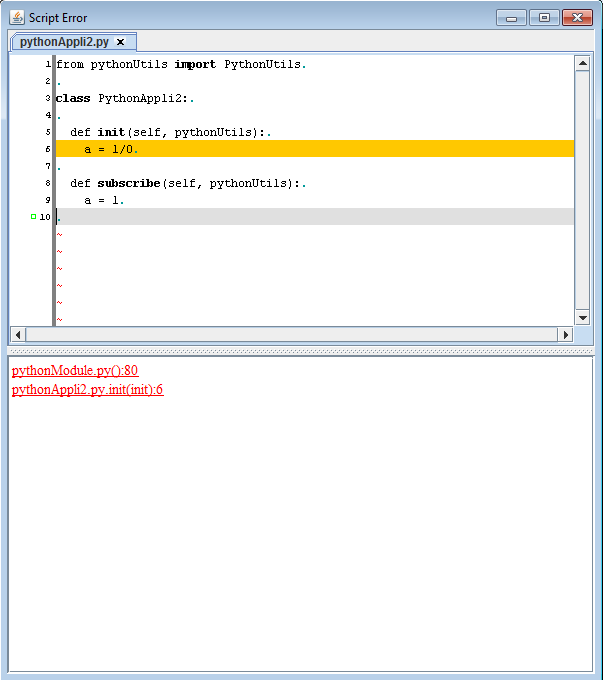Home
Categories
Dictionary
Glossary
Download
Project Details
Changes Log
What Links Here
FAQ
License
Python modules overview
1 Python scripts using UDP or TCP sockets
1.1 Python library
2 Python scripts using http requests
2.1 Python http library
3 Debugging Python modules
4 Example
5 See also
1.1 Python library
2 Python scripts using http requests
2.1 Python http library
3 Debugging Python modules
4 Example
5 See also
Python modules are modules which are scripted in the Python scripting language. There are two kinds of Python modules:

Two generic additional Python scripts are necessary to handle the communication between the Python module and the Python script:
The fact that the Python script is executed by a Python process started by the framework allows to use any Python version for the script, and even to use various different versions for different scripts (Python 2, Python 3, etc...).
In order for the Python script to work properly, you must copy two additional Python scripts which will be used as a library in the same directory as the script itself:

Two generic additional Python scripts are necessary to handle the communication between the Python module and the Python script:
In order for the Python script to work properly, you must copy two additional Python scripts which will be used as a library in the same directory as the script itself:
As for all scripts, the framework help debugging the Python scripts by showing the Python SctackTrace in case of an execution error in the script.
If the

We could have the following code for the script:
- Modules which communicate with the associated Python script using UDP or TCP sockets
- Modules which communicate with the associated Python script using http requests
Python scripts using UDP or TCP sockets
These Python modules allow to execute Python code in any Python 2 or Python 3 environment:- A Python module creates a Python process using the Python executable path defined in the framework properties. By default the framework will look for a Python 2.x executable among the applications installed on the System
- The started Python process will execute a specified Python script
- Services reception from the Python module will be deferred to the associated Python script using an UDP communication
- Services invocation from the Python script will be deferred as a Python module Service invocation using an UDP communication

Two generic additional Python scripts are necessary to handle the communication between the Python module and the Python script:
- The
pythonModule.pyscript is responsible for the Services subscription in the Python environment - The
pythonUtils.pyscript is an utility script usable by the user Python script
The fact that the Python script is executed by a Python process started by the framework allows to use any Python version for the script, and even to use various different versions for different scripts (Python 2, Python 3, etc...).
Python library
Main Article: Python module
In order for the Python script to work properly, you must copy two additional Python scripts which will be used as a library in the same directory as the script itself:
- The
pythonModule.pyscript - The
pythonUtils.pyscript
Python scripts using http requests
These Python modules allow to execute Python in a Python 3 environment:- A Python module creates a Python process using the Python executable path defined in the framework properties. By default the framework will look for a Python 3.x executable among the applications installed on the System
- The started Python process will execute a specified Python script
- Services reception and invocation will use http requests

Two generic additional Python scripts are necessary to handle the communication between the Python module and the Python script:
- The
pythonHttpModule.pyscript is responsible for the Services subscription in the Python environment - The
pythonHttpUtils.pyscript is an utility script usable by the user Python script
http.client and json modules, so this Python implementation require Python 3.
Python http library
Main Article: Python module
In order for the Python script to work properly, you must copy two additional Python scripts which will be used as a library in the same directory as the script itself:
- The
pythonHttpModule.pyscript - The
pythonHttpUtils.pyscript
Debugging Python modules
Main Article: Debugging scripts
As for all scripts, the framework help debugging the Python scripts by showing the Python SctackTrace in case of an execution error in the script.
If the
debugScripts property is turned on, the framework will additionnally show a Popup window allowing to navigate in the source for the Stack trace for the first encountered exception. For example:
Example
In the following example, theFlightManagementSystem module:- subscribe to the
positionpublish service - subscribe to the
directToevent service - provides the
computeFlightPlanrequest-response service
<pythonModule name="FlightManagementSystem" > <pythonImplementation path="pythonAppli"/> <interfaces> <subscribe service="position" /> <eventReceived service="directTo"/> <requestReceived service="computeFlightPlan"/> </interfaces> </pythonModule>Another way to specify the Python module is to explictly specify the ports and port sizes for the Java / Python communication:
<pythonModule name="FlightManagementSystem" > <pythonImplementation path="pythonAppli" inputPort="6000" outputPort="6005" inputSize="1024" outputSize="1024"/> <interfaces> <subscribe service="position" /> <eventReceived service="directTo"/> <requestReceived service="computeFlightPlan"/> </interfaces> </pythonModule>
We could have the following code for the script:
from pythonUtils import PythonUtils class PythonAppli: def subscribe(self, pythonUtils, serviceName): service = pythonUtils.getService(serviceName) if serviceName == "position": // get position ... elif serviceName == "directTo": // compute directTo ... elif serviceName == "computeFlightPlan": // compute FlightPlan and sends the response ...
See also
- Python modules: Python modules are modules which are scripted in the Python scripting language
- Python tutorial: The Python tutorial is based on the first tutorial, but one of the modules is implemented in Python
- Second python tutorial: The second Python tutorial is based on the first Python tutorial, but with one start method
×
![]()
Categories: concepts | python